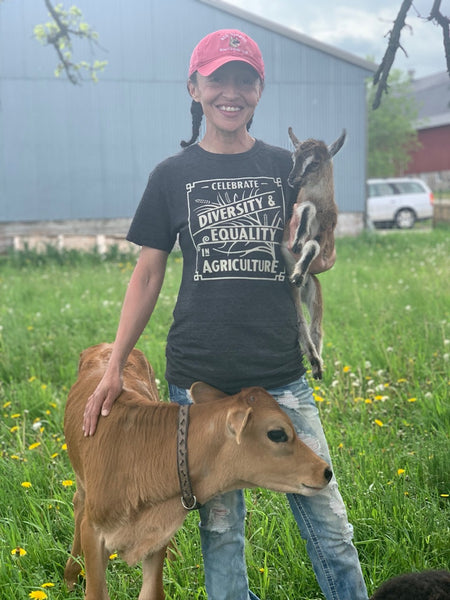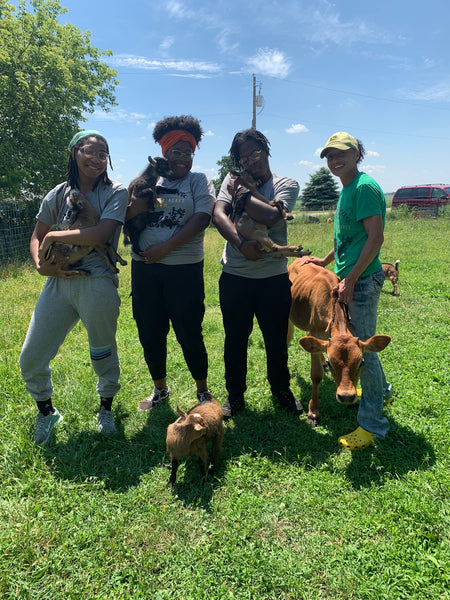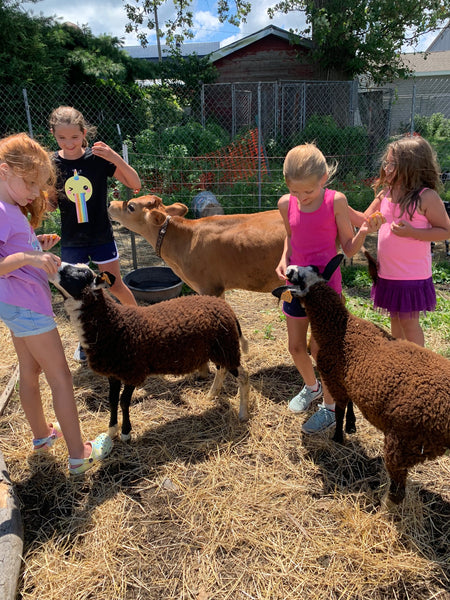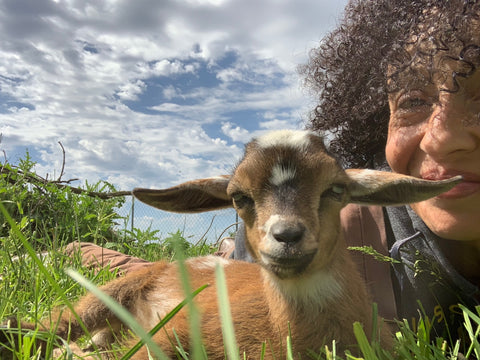
We are a small farm focused on returning our five acres of former row cropland into the beautiful prairie it once was and is meant to be through regenerative agriculture and sustainable practices. By using multi-species (goats, sheep, cows, & calves) rotational grazing we are working at regenerating the land and raise nutrient-dense, grass-fed meat in the process for ourselves and others. When the grazers move on, any invasive species are pulled and native/cover crop seeds spread in the fields. Chickens and ducks free range the entire property as they please delighting in bugs & bits, grasses, and of course my favorite task they perform - cleaning up and spreading the manure from the grazers.
We believe food heals, I’m a chronically ill testimony to this, and know this healing only comes through meat, eggs, and dairy raised in the sunshine, sucking fresh air as they were created to do. Our passion is to invite people in to experience the farm, see how their food is raised and the dairy girls contributing milk to their body products are treated, answer questions, share simple ways to ditch all the nastiness in products that have taken over our households and get back to simple, clean living.
We are currently fundraising to Build A Bridge to Loveland. We believe access and opportunities in farming and overall health and wellness shouldn’t be a privilege. We are looking to change that by sharing space on the farm with underserved populations in the Milwaukee and Madison areas and anywhere in between. Through multifaceted agricultural programming kids and young people can learn what it takes to be a farmer, find their niche, and care for the land/animals that roam it all while raising and making products to tangibly work toward food sovereignty now. An investment in time and love today leads to well balanced, healthy adults in the future.
_____

____
How did you get into farming?My fondest memories as a child were being under the feet of my dad and uncles on the various farms they ran. Being a mixed-race kid at that time was rough, still is, and I found my peace roaming the barns with the various critters. They would let me raise various runts and I learned at a tender age exactly what I was raising them for. And you know what? I was okay with it. Even at a young age, I understood they had a good life and in turn nourished me. As time went on I had dreams of being a dairy farmer, all those trips to WI from IL looking at cows did it, but my dad frowned upon it.
I went on to pursue a different passion in working with special education and inner-city kids, enjoying and pointing out cows anytime I saw them still. I was just hitting my stride in my teaching career when I became horribly ill. Many months of testing and unknowns brought about a diagnosis of lupus, followed by gastroparesis, followed by Hashimoto's and a sleuth of other things that came with those. I was forced to leave teaching and became quite depressed frankly.
I floundered around because what I thought was my purpose in life, beyond raising my family, had been taken from me by illness. I was teetering on the brink and then I got a heart nudge to get goats. After some research, I discovered how valuable goats could be in helping with some of my health issues and it was all systems go. Breeding stock was brought in and raised, bred, and just when my docs told me I needed a feeding tube to live - my girls came into milk for the first time. I politely declined the feeding tube and said I’d be choosing raw milk instead. Best decision of my life as it opened my eyes to what real, unaltered food can do for one’s body and well being. It was also during that time of milking goats my first season I declared myself a farmer and saw the vision of what this land was entrusted to us for: to unite city kids with country kids to experience hands-on learning on a working farm and all the life lessons it has to offer.
____

____
What are some of the biggest challenges you face as a farmer?
The first thought that comes to mind is goats getting out, ha! In all seriousness, one of the biggest struggles is having the upfront capital to get things in place to keep moving forward. Discrimination in the mortgage process left us with an insane rate and my medical disabilities cut our income from two to one. Struggling through has become the norm because without the farm and the products it gives us, my life would be in jeopardy and we know there are other people in the world, especially Wisconsin that need a place of peace and food security so we continue on.
Crazy weather patterns have been a great significant challenge as well. As rain amounts increased over the past few years we’ve struggled to keep portions of our land dry enough to move forward with fencing, seeding, and eradicating species that don’t belong. This has caused challenges in creating rotational grazing routines as well as increasing the overall daily workload due to moving one animal at a time to a new area. This has also lead to difficulty finding quality hay for our ruminants for the winter season and in turn, has caused us to work double-time ensuring all stay healthy through Wisconsin’s winter and to cover the increased expense of hay being produced.
And lastly, in a climate of continuing racism, it’s challenging to be a black female farmer. Opportunities and access, even with land, look drastically different.
____

____
What are some misconceptions you hear about farming and agriculture when it comes to climate change that you'd like to address?
The misconception I’d like to address most is: livestock farming is destroying the planet. Our livestock has been highly instrumental in our regenerative process and will continue to be. They have grazed down brush and weeds allowing us to seed with native grasses and cover crops restoring land with vital nutrients and minerals as they go through with their manure droppings.
What little methane our cows produce is actually a valuable part of the carbon cycle. Methane is released, through burps not farts people, and broken down into CO2 which plants then consume and release the oxygen for us to use. The overload of CO2 has come from fossil fuels, not bovines folks. Working with Mama Earth’s naturals rhythms is always the way to go. The more you know.
____

____
What future are you farming for and how do you think your farm can make a difference?
I’m farming for a future where all people, but particularly underserved youth, have access to local, nutrient-dense food raised in a humane, holistic, and sustainable way. A future that allows people the freedom to make those food choices without numerous government regulations and corporations choosing for them. A future where small, local farms can be the providers of this food and other products without numerous, costly hoops to jump through in order to do so. A future that embraces teaching a spectrum of people, young to old, they can make a difference and immersing them in experiences to empower them to be able to do just that. A future where all children have a place in the fields and a seat at the harvest table surrounded by nourishing, radical love.
____
Where can we follow along and support you?
GoFundMe: Build A Bridge To Loveland Acres
Website: www.
Instagram: @lovelandacresfarm

